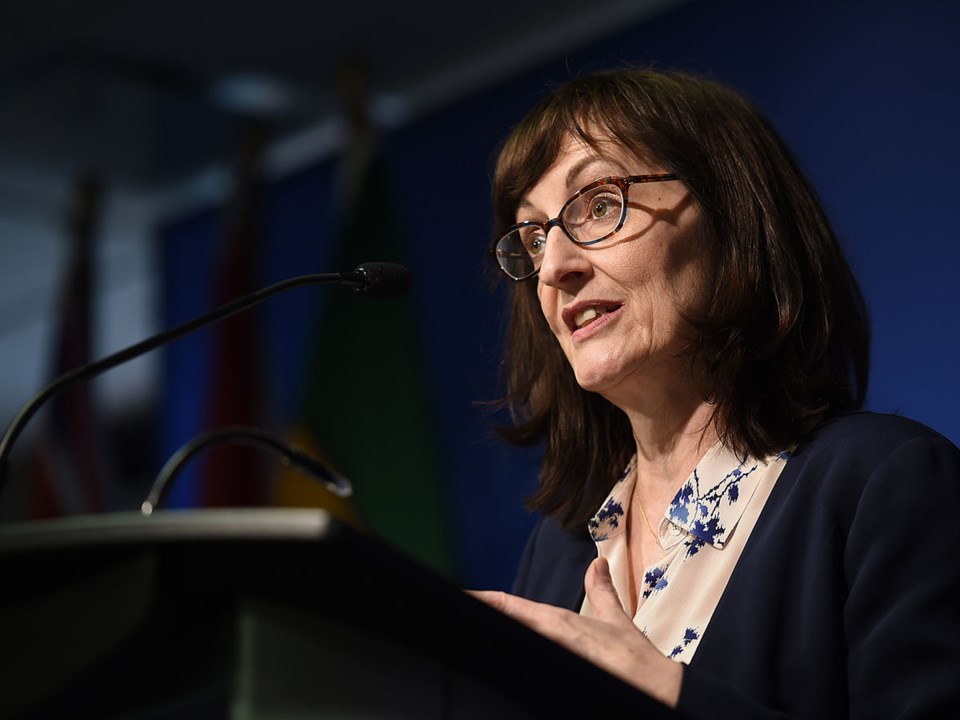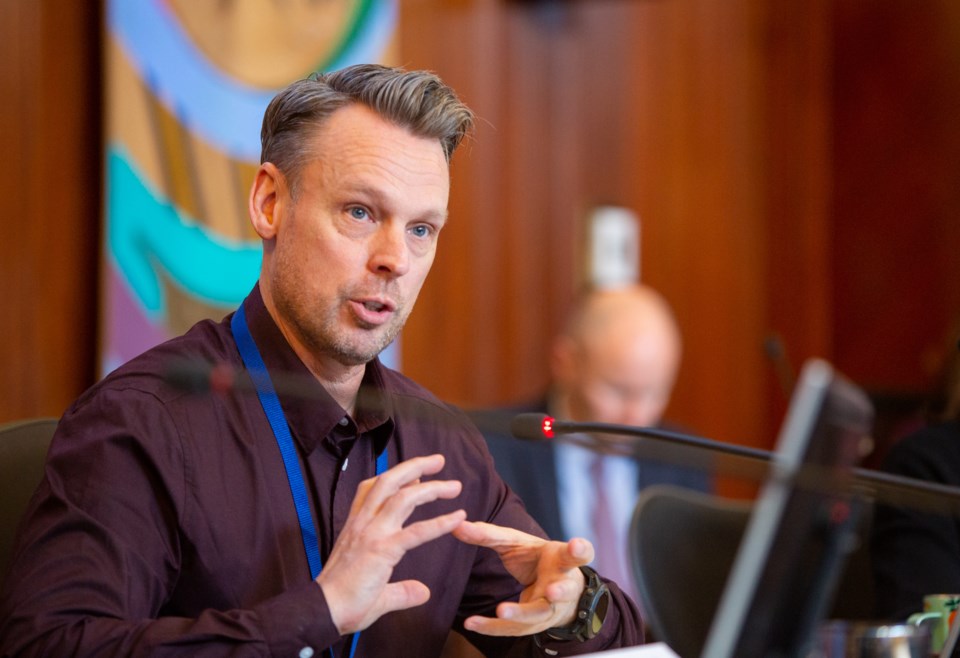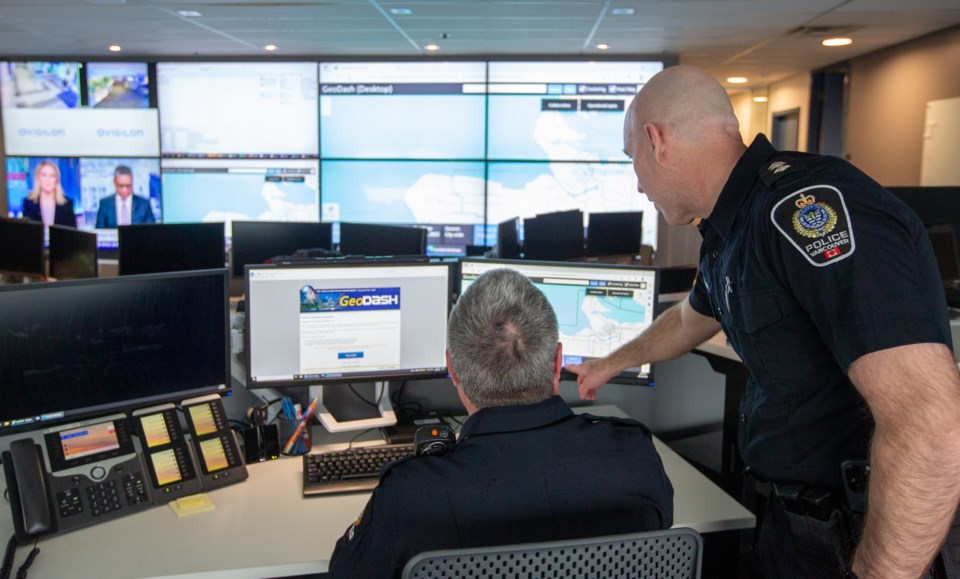A two-person rotating team of psychiatric nurses recently embedded in the Vancouver police department’s operations command centre has resolved or diverted a significant number of calls that would have otherwise been handled by officers.
Over a 64-day period between June and September, the nursing desk inside the command centre triaged 579 calls and directly resolved or diverted 318, or 55 per cent, of the calls to a “health care, non-police response.”
“We're seeing really good results,” Police Chief Adam Palmer told the police board at last week’s meeting. “[They are] very experienced nurses who have worked in Car 87/88 [mental health team] and on the street. So they're very street savvy, they know the business well and they can just cut to the chase.”
Vancouver Coastal Health (VCH) provided the call data to Glacier Media this week in response to questions about the status of an ABC Vancouver campaign promise to hire 100 mental health workers and 100 officers.
City council was unanimous in February in approving an unprecedented city-funded plan that allowed VCH to begin hiring 58 mental health workers and expand services to respond to people living with a mental illness.
The multi-pronged initiative was estimated to cost $2.8 million this year and increase to $8 million next year, with the long-term goal to have 100 mental health workers devoted to addressing what experts have described as an ongoing crisis that worsened during the pandemic.
The two nurses working in the VPD’s command centre are among the 14.5 positions VCH has filled since council unlocked funds to hire more mental health workers. The total number of hires is far short of the 58 promised in February.

'Health human resource crisis'
Glacier Media made requests to interview VCH’s chief medical health officer, Dr. Patricia Daly, and Bob Chapman, the health agency’s vice-president for Vancouver Community, to understand why so few positions had been filled.
Glacier Media was told they were not available.
Daly and Chapman delivered a presentation to council in February, where Daly said she was confident the health agency’s human resources department would find the people needed to do the work.
“It will take time to fill these positions,” she said at the time. “We do have a health human resource crisis in B.C., but we also have a very robust plan to address that put forward from [Health] Minister Adrian Dix.”
Of the new 14.5 positions, which includes the two psychiatric nurses, 7.5 are connected to the VPD’s long-running Car 87/88 programs, which pairs a police officer with a psychiatric nurse. Another four positions for the programs still need to be filled.
“We are aiming to undergo another wave of hiring for nurse roles after these roles are filled,” a VCH communications department representative said in an email.
Another seven people are now working for what the health agency described as a “moderate de-escalation team,” or MoDe. The team launched Oct. 17 and includes a clinical resource nurse, a mental health clinician and several non-clinical operational and support workers.
“Eight nurse and mental health clinician roles are currently under active recruitment and the program will expand the sites they are working with as the team grows,” VCH said. “We are aiming for a second wave of hiring in early 2024 once we have monitored implementation, received feedback and reviewed the needs of the service.”
'Sophisticated mental health regimes'
Palmer mentioned the MoDe team at the Oct. 19 police board meeting, saying it now gives Vancouver the “full spectrum” of police and non-police services dedicated to mental health calls.
“I think most of you know that we have one of the most sophisticated mental health regimes in North America — bar none,” said Palmer, citing several police and non-police programs, including outreach teams. “There was one slight gap and that gap is now being filled.”
Of the 58 positions promised, 32 are supposed to be dedicated to creating a non-police “de-escalation program” that would be responsible for helping people whose mental health is deteriorating.
The plan calls for at least 12 others to help bolster police-led crisis intervention teams such as the Car 87/88 programs.
Another dozen people are supposed to be hired to “strengthen Indigenous approaches” across all of the health agency’s urgent mental health services and “develop a comprehensive and seamless referral network to culturally-specific programs and services,” according to a staff report that went before council in February.
No one has been hired for those positions.
“VCH is continuing to engage with Indigenous partners to help guide implementation of an Indigenous-led crisis response team, which will strengthen the health authority’s approach to the delivery of urgent mental health services for Indigenous community members,” VCH said in its email.

'These things take time'
ABC Coun. Brian Montague, a retired 28-year member of the VPD, said it didn’t concern him that all 58 positions hadn’t been filled yet.
Montague said he had “no illusions that we were going to find 100 cops or mental health nurses the day after we passed that motion” in February.
“These things take time,” he said. “It's not like we're hiring for a low-skill or no-skill job here. We need to make sure we have the right people in those positions. If you don't, things can go sideways very quickly.”
Montague said he expected people will criticize council and VCH for not hiring more mental health workers, but added that “the vast majority of those critics probably don't know what they're talking about. Patience is a virtue.”
The councillor said the ongoing debate about whether police should be involved in mental health calls includes people emphasizing the need for more preventive measures in place to avoid crisis calls to police.
“I don't think you'll find an argument from anybody about that,” he said.
“But until we get there, we have to deal with the here and now, and the short-term problems and issues that we're facing — and that's having our first responders having the tools they need to do their jobs appropriately. And one of those tools is the mental health nurse.”
1,249 Mental Health Act apprehensions
Unlike New Westminster, Victoria, North Shore and some other B.C. cities, Vancouver does not have peer-assisted care teams, or PACTs. Palmer has told Glacier Media they are not needed in the city because Vancouver is already equipped with a myriad of mental health resources.
He reiterated his position last week.
The scale of the mental health crisis in Vancouver can be captured partly in the data police track on the number of apprehensions officers make under the Mental Health Act.
Data for the first six months of this year show police made 1,249 apprehensions, involving 945 people. A total of 287 people had been apprehended more than once in the past four years.
Meanwhile, ABC Vancouver’s other promise to hire 100 officers is well underway, with Palmer commenting last week that the department has hired 116 officers this year. The majority are new recruits, mixed in with experienced officers from other departments.
But Palmer has made it clear in previous interviews that the department hires 50 to 75 officers each year to account for attrition. That means the department needs to hire upwards of 175 officers for ABC Vancouver to make good on its promise.





